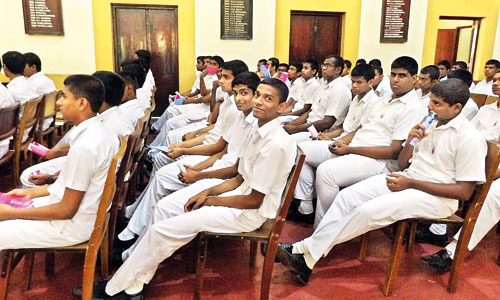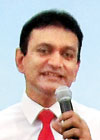A,B,Cs of beating exam stress
View(s):Too many hours spent on cramming and tuition and too little sleep and relaxation are making students sick with anxiety, warns Consultant Psychiatrist Dr. Gihan Abeywardena
By Kumudini Hettiarachchi

How to prepare for exams: Trinity College boys give ear to Dr. Abeywardena's advice
It may be around six months more to the next General Certificate of Education (GCE) Advanced Level (A/L) examination due to be held in August, but already there are numerous children seeking ‘treatment’ from Consultant Psychiatrist Dr. Gihan Abeywardena attached to the Kurunegala Teaching Hospital.
“I simply can’t remember anything I study,” is a common complaint, while “my mind goes completely blank even at the term tests” is another. This, they claim, is after poring over their books for as long as seven to eight hours each day, with “hardly any sleep” in addition to attending school and numerous tuition classes.
Most of these students are not depressed, but very anxious, says Dr. Abeywardena who is now doing the rounds of the schools advising A/L students on basic examination preparatory skills. He was at Trinity College, Kandy this week.
Before getting down to meticulous details on how to prepare for a major examination like the A/L not only by studying effectively but also having adequate sleep and leisure time, he talks to them of the ‘Nine A Syndrome’.
Securing 9 As at the Ordinary Level (O/L) examination is very easy, according to him, and many students get swollen-headed. Sometimes, these very same students fail all three subjects at the A/Ls, for the A/Ls are much more difficult.

Dr. Gihan Abeywardena
Comparing and contrasting the O/Ls and the A/Ls, he is quick to point out that the O/Ls test the knowledge of facts. Teachers have spoon-fed O/L students who have more or less memorized all that and just spew forth (vamaranawa) the information at the exam. At the A/L, students are tested on concepts and principles and their analytical ability and application of these concepts/principles. Those children who have not performed too well at the O/Ls should also not get upset because the ‘real’ exam is the A/L.
Tuition classes, Dr. Abeywardena deals with next. Students are bombarded by tuition, both by their parents and their peers. Do you know that many A/L students attend three tuition classes per subject making it nine tuition classes in addition to school-time. This leaves no time even to read, let alone digest what they have been taught. They are exhausted because all this eats into their precious and essential sleep-time.
Students from Matale assume that the classes held there are not good enough, so they either come to Kurunegala or Kandy. Some Kurunegala children go to Colombo and even vice versa. A student’s day starts very early and ends very late, it is learnt.
“Select your tuition classes intelligently. It should be one class per subject and only two per subject if there is a dire need, for everyone has a limit or capacity,” he says, adding, “never go for tuition from morning to night as it is counter-productive”.
 Pointing an accusing finger at tuition teachers, he says that they hold lengthy classes, sometimes as much as 4½ hours at a stretch, with only a tiny break. They do it for money and the students cave in due to the herd mentality strongly prevalent in the country. Another trend is for non-teachers such as engineers and doctors to make a quick buck by “giving tuition”.
Pointing an accusing finger at tuition teachers, he says that they hold lengthy classes, sometimes as much as 4½ hours at a stretch, with only a tiny break. They do it for money and the students cave in due to the herd mentality strongly prevalent in the country. Another trend is for non-teachers such as engineers and doctors to make a quick buck by “giving tuition”.
Select your tuition teachers with care, urges Dr. Abeywardena, suggesting that the best would be ‘teachers’ who go in for paper correction or those who are involved in curricula development. Remember, all others who are very quick to display large posters with huge photographs of themselves in film-star stance are not teachers. They may have the subject knowledge, but they are not trained and skilled at teaching, to impart knowledge.
Reiterating that stress is essential in life but the secret lies in managing your stress without becoming highly anxious, he then moves onto how a student should get about with his lessons, when preparing for the A/Ls.
A good way to learn material is SQR3, MediScene understands:
S – skim or survey the study material
Q – make your own questions on the subject matter that you have skimmed or surveyed
3Rs – Read: Then find answers to your own questions through more in-depth reading; Recite: Read aloud your answers to yourself or your parents or teach somebody else; Review: Summarize and re-read
Conceding that the A/L syllabi are very vast, Dr. Abeywardena says that students should develop the ability to write their own short-notes. Critical of the new trend set by bookshops of selling short-notes, he tells students that it will not be good for them. “Your picture memory is better than your factual memory. So your own short-notes should be a flow chart with a few words, small cartoons, mnemonic signs, in song or verse form (like the Periodic Table in chemistry with ‘Little Betty…..). Then it gets fixed or implanted onto your brain well.”
Sometimes, girls tend to colour-code their books – marking in red the very important sentences, in orange and yellow in diminishing order of importance. That may be okay, but better to have a word or two to jog your memory outside the book, he says.
He also recommends that students should study in small groups otherwise the stress levels could reach unbearable levels. The study group should be two or three who are at the same level and not more than that as beyond that would be a “crowd” and a distraction. In a small group, three books would be open, with one student asking a question and the other two answering, followed by arguments and debates. It would be very easy to recall such a scene when a similar question is seen on the examination paper, helping the right answer to come quickly. It would also help the students to realize that others are in the same plight.
There is also a need to answer past papers and model papers, without re-studying the content of a subject over and over again.
| Tips for A/L studentsVery specific are Dr. Gihan Abeywardena’s suggestions to A/L students who are hoping to sit the examination in August 2017. Follow the EFT Principle of Time Management — an effective method of managing your time with regard to any activity (assignments, exams, work, etc.) E Exploration 60% F Fixation 30% T Testing 10% He divides the 170 days left up to August 7 thus: Intensive study phase (fixation) — Consolidate everything you need to study; make meaningful summaries; and memorize the work which needs to be memorized! Test yourself — Ask yourself & answer questions which cover the study material; use the study material to formulate questions; use old exam questions to practise; and have group study sessions
How to beat academic anxiety Intellectual symptoms — Problems remembering & recalling newly learnt material and problems with logical thinking and problem-solving.Emotional symptoms — Feelings of panic, especially that there is not enough time to complete an exam and feeling inadequate, with negative thoughts such as: I’m a bad student, I’m stupid and worthless. What is needed is ‘Positive Thinking’, says Dr. Abeywardena: | |


